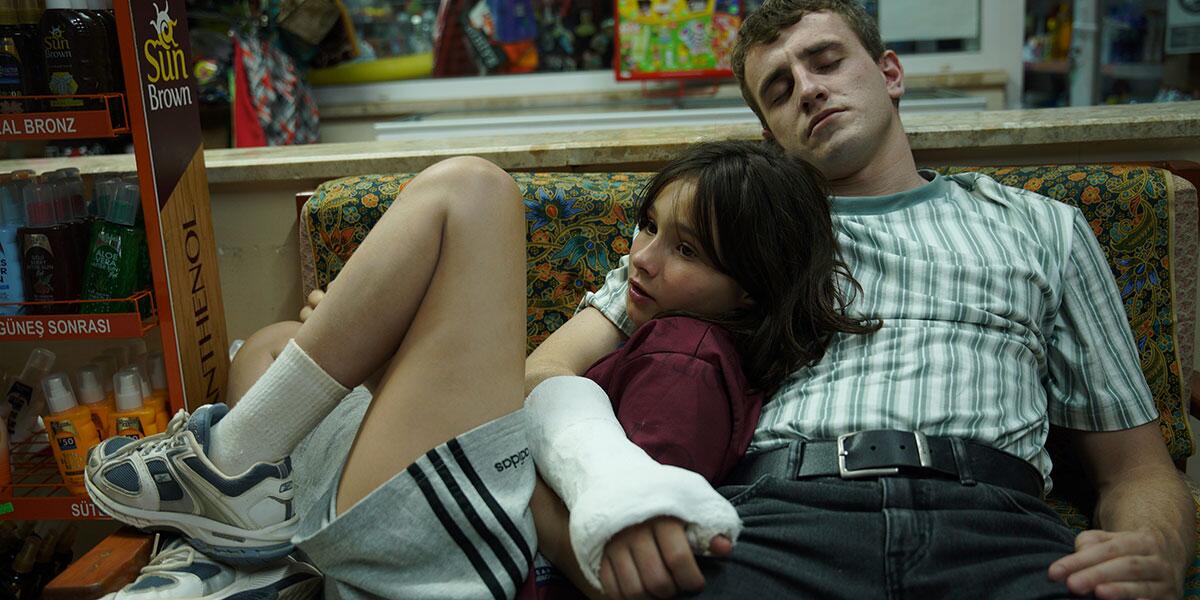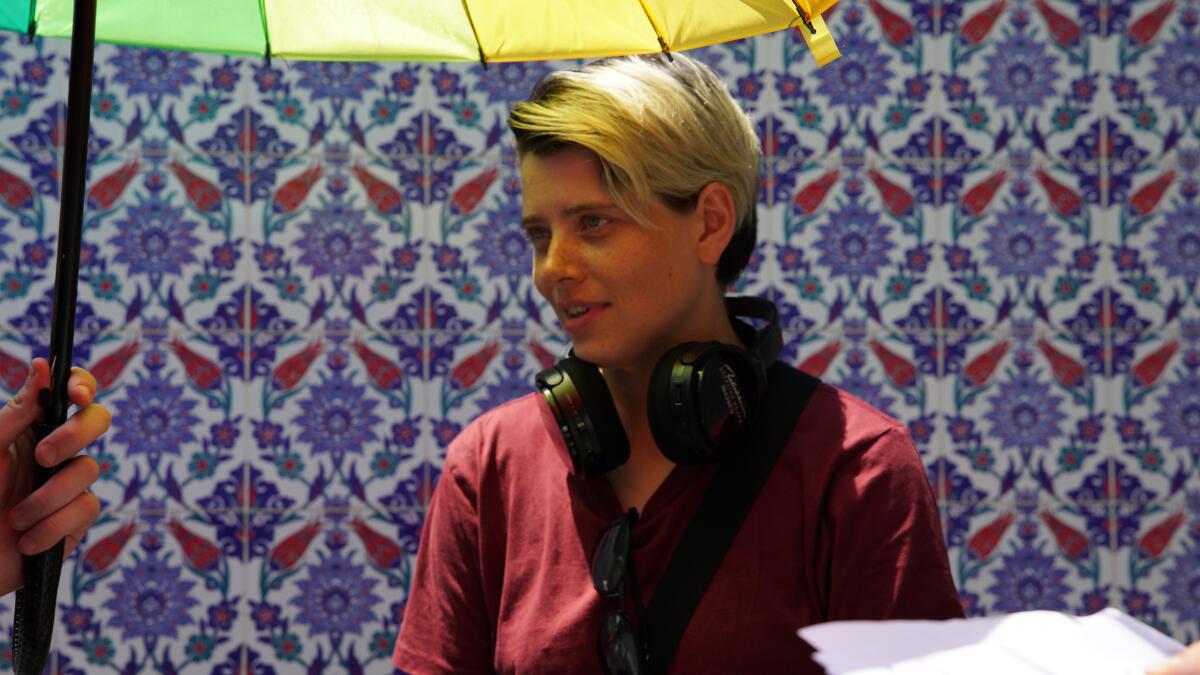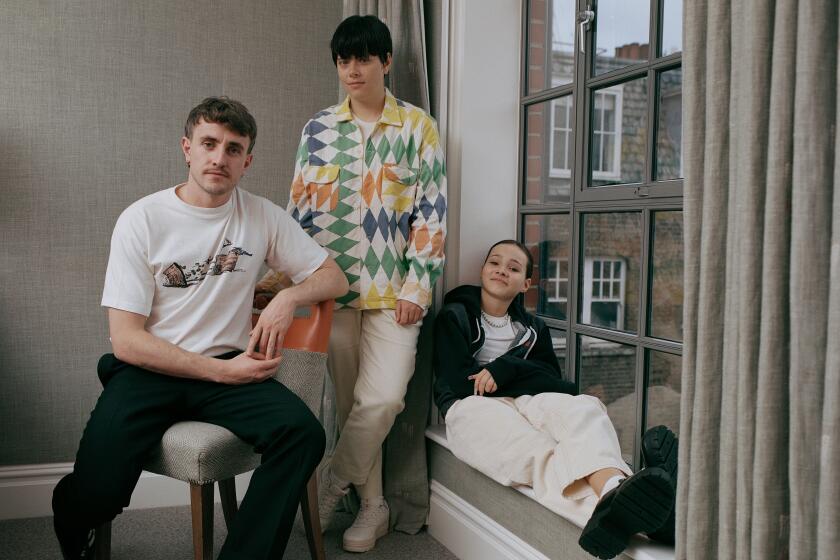How director and star create emotional power with glimpses of memories in ‘Aftersun’

- Share via
Near the end of the luminous drama “Aftersun,” there’s an image both striking and mysterious. We see Calum, a young single father on vacation with his daughter Sophie — he’s sitting alone on his hotel bed, his back to the camera, apparently naked, hunched over and sobbing. It’s not clear why he’s crying — nothing in the movie to that point has suggested a reason — yet the unguarded outpouring hints at something festering inside him, an ineffable anguish neither his child nor the audience quite registers.
Loosely inspired by events from her own life, writer-director Charlotte Wells’ feature debut is filled with such intimate glimpses of a late-1990s Turkish getaway that the adult Sophie (Celia Rowlson-Hall) is now looking back on while pondering her unknowable dad, portrayed with restrained melancholy by Paul Mescal.
Speaking on a video call from London, Mescal remembers shooting that pivotal, wordless scene. The secret was letting its mystery speak for itself.
“One of the bigger discoveries that I made was deciding not to diagnose Calum,” he says. “Not putting a set of symptoms on him. I feel a great deal of empathy toward Calum, his confusion and fear. Making that decision gave me room to generate the size of the feeling that that scene is. I find when you see a character working something out — or not understanding something — that’s interesting. I tapped into a feeling that he has no control of.”
Wells, based in New York but also in London on this early November call, listens and nods. Her film is very much about memory — how certain moments stay with us forever, but also how our interpretation of events can differ from what actually happened. After a series of standout shorts, Wells spent years developing “Aftersun,” but the story’s beautiful elusiveness — its accumulation of seemingly inconsequential fragments that gradually accrue in emotional power — makes it a difficult movie to encapsulate, even for its maker.
The ‘Normal People’ heartthrob, co-star Frankie Corio and director Charlotte Wells on the relationship between their film ‘Aftersun’ and real life.
“Articulating in words is always a challenge,” the soft-spoken Wells says, laughing sheepishly, “which is why I like film.” During the project’s beginning stages, she would meet with Oscar-winning “Moonlight” producer Adele Romanski, in which Wells “probably fumbled some vague impression of what this was. It was certainly very hard to describe — and still is, in some ways, to concisely get at the heart of what this is.”
Mescal, acclaimed for his sensitive work in “Normal People,” had been mentioned for Calum, this loving but recessive father doting on 11-year-old Sophie (newcomer Frankie Corio). But after he was initially unavailable, the film’s production schedule changed, allowing him time to read the script. “Maybe it’s a competitive streak,” he says, “but I read it on a Friday and responded to my agents before close of business: ‘We need to set up a meeting with Charlotte.’ And then I read the script another two or three times over that weekend. If I’m talking honestly, I was trying to get my foot in the door early, because I assumed that any actor worth their salt would be immediately interested.”

Both filmmaker and actor exude a gentle air — and perhaps some reticence about potentially shattering their movie’s dreamlike spell by over-explaining it. But if Mescal resisted identifying what is plaguing Calum, Wells did her due diligence while shaping the character.
“I have to write with a specificity, even if the character doesn’t understand what’s happening to himself,” she says. “That specificity is not necessarily perceivable. Mental health struggles are messy, symptoms overlap and diagnoses are often [incorrect]. It’s incredibly difficult to pinpoint many mental illnesses. I did a lot of research around this over several years when writing the script, and some of the most satisfying responses that I’ve received to the film have been from people who have articulated that it expresses something close to what they’ve experienced in a way that they haven’t seen before. It feels like that work was very valuable.”
Because of the movie’s memory-piece design, Wells and Mescal were, essentially, constructing an idea of Calum built out of Sophie’s fragile recollections. Mescal focused on playing him with utter immediacy, which presented issues for Wells when he’d turn to her for guidance. “The idea of it being a memory gave me an out,” she notes. “If Paul [asked] a question around motivation, sometimes I would just be, ‘That’s a memory, I don’t know.’ But Paul’s inhabiting a person, not a memory — it was an interesting thing to negotiate. I was forced to find a presence in it, too.”
In this process they were aided and abetted by Corio, with whom Mescal bonded simply by being a pal to his inexperienced co-star. “When you’re working with somebody who hasn’t worked as an actor before,” he says, “the easiest way in was the simplest, which is to enjoy the person’s company first and then worry about the acting later.” But fittingly for a film so attuned to the bittersweet imperfection of memory, Mescal will occasionally preface his remarks by saying, “I don’t know if I’m misremembering this,” suggesting that even the experience of making “Aftersun” is susceptible to being subtly altered through retelling. “I realize that I don’t remember some of the moments that people want to talk about,” he confesses. “It’s through repetition of hearing other people talk about it that I remember.”
His confusion is understandable: The way “Aftersun” deceptively drifts from scene to scene — punctuated by meditative cutaways of a person’s hand or a random passerby yelling at his kid — the individual pieces can be as ephemeral as half-forgotten anecdotes. This seeming looseness was painstakingly crafted.
“Some of [those shots] were whole scenes reduced to an image,” Wells says. “Some were details in the script, and some were discovered on set based on months, if not years, of conversations with my cinematographer.” When it’s suggested the deft execution of “Aftersun” feels like a magic trick, she demurs. “I don’t have an answer as to what it is,” she says. “We didn’t set out to pull off an emotional heist.”
Yet “Aftersun” operates on a subliminal wavelength that leaves viewers unprepared for its slowly building poignancy, which is as haunting as the mysteries Sophie will never unravel about her troubled father.
“I never doubted the integrity of the emotion that I was trying to express,” Wells says. “If I’m emulating anything, it is intimate films that mean something to me. I had the experience of making [short] films that very few people understood, but the few who did seem to connect quite meaningfully to them. And that was my hope for this — that a few people would connect in a profound way.”
She laughs. “It still doesn’t work for everybody. But it certainly works for a lot more people than we expected it to.”
More to Read
Sign up for The Envelope
Get exclusive awards season news, in-depth interviews and columnist Glenn Whipp’s must-read analysis straight to your inbox.
You may occasionally receive promotional content from the Los Angeles Times.










